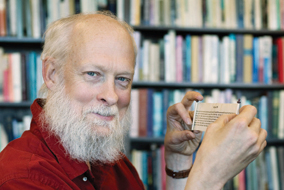
Prof's contact hours and grading will increase, but his colleagues were all game, says History Dept. Head Daniel Vickers - photo by Martin Dee UBC Reports | Vol. 53 | No. 8 | Aug 9, 2007
History Profs Boldly Re-make Program
By Lorraine Chan
They say history is written by the winners. At UBC, it’s also written by undergraduates.
Starting this September, all fourth-year history majors will have a chance to conduct original research in small group seminars.
These students will learn to design projects and then bring them to fruition through empirical research, logical reasoning and literary production. This departs from past fourth-year experience where students would attend lectures and produce papers based mainly on the writings of modern historians.
“The idea is to bring the practice of leading-edge scholarship into the classroom, and to engage students to do history for themselves,” says History Dept. Head Daniel Vickers.
Previously, the Dept. of History could only provide graduate and honours students -- about 10 per cent of the annual enrolment of 200 history majors -- the luxury of this type of learning.
“That meant 90 per cent didn’t get this kind of attention,” says Vickers, “and we felt that had to change.
“We want to reverse the trend seen during the past few decades in most public universities toward large lectures,” says Vickers. “Yes, they can be valuable. They’re certainly more affordable, but it has made student learning much too passive.”
The seminars are weekly, two-hour sessions with no more than 15 students. Leading these are full-time faculty, who designed the seminars to intersect with their areas of expertise.
“One of our historians specializes in history of Judaism,” says Vickers, “and will teach a seminar on the comparative history of genocide. So it’s not a chore for him. It’s something he wants to do, although it does represent more work because students hand in multiple drafts of a paper.”
Students will be able to choose from a slate of 13 themes, among them “The Medieval Family,” “First Contacts in the Pacific World,” and “Sages and Statecraft in China.”
Vickers says fourth-year students will be able to delve into primary sources such as public records, diaries and travelers’ accounts. “The seminar teaches them how to read newspapers with the eye of a historian, to be sensitive to biases in memoirs and look at what is not said -- what the person isn’t writing down.”
These small groups will hone students’ methodology and also foster confidence about putting their ideas on the line.
At the end of the year, students will present and discuss their papers “much the way professional historians present papers at conferences,” says Vickers.
These seminars follow on the heels of other changes the department has made to enhance student-centred learning. During 2006-07, the department introduced a new first-year curriculum, replacing the general survey courses focused on the history of a single country. The new courses provide global histories on topics such as the environment, cultural exchange and the relationship between the global and the local in past times.
Re-jigging fourth-year curriculum to promote independent inquiry looked daunting at first. But his colleagues devised a “reasonable and efficient” solution “that blew me away,” says Vickers.
“I have never encountered anything like it at any other university at which I’ve taught. If I had suggested this at the California university where I was head until last year, there would have been a riot.”
To keep preparation time manageable, 26 professors decided they would each lead a seminar every two years, then teach the material to two cohorts. With each accommodating 15 students, the 13 seminars would provide 375 seats.
Professors’ contact hours would go up by 20 per cent and grading by another 10 per cent. However, “grading 30 papers in a subject that’s of interest to you is a lot easier and less stressful than grading 70 papers that would be all over the map,” says Vickers. |
